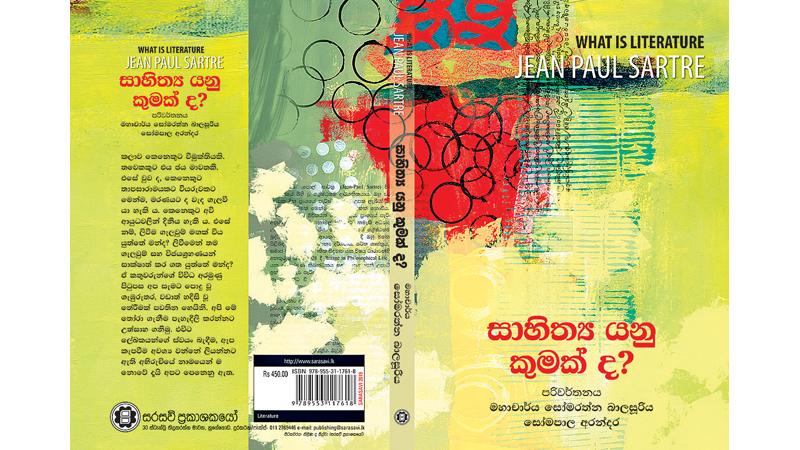
Titile: Sahithyaya Yanu Kumakda?
Author: Prof. Somaratne Balasuriya and Somapala Arandara
Sarasavi Publishers
252 pages
Sahithyaya Yanu Kumakda? is an authentic Sinhala translation of Jean Paul Sartre’s monumental work, What is Literature? Sartre was one of the most important philosophical and political thinkers of the 20th century. His writings had a potency that was irresistible to the intellectual scene that swept post- war Europe leaving a vital inheritance to contemporary thinkers.
The central tenet of his writings was the Existentialist Movement which replaced God and opened the doors to a new way of thinking.
It was embraced by the new generation that had seen the horrors of World War II and the emergence of Nazism. Sartre’s ideas revolutionised the post-war thinking in general and literature in particular. Being a novelist and an eminent philosopher, Sartre addressed the phenomenon of literature exploring hitherto unexplored areas in literature. He raised the questions: Why do we read? Why we do we write? The book under review provides the answers.
The book consists of four chapters: What is writing? Why write? For whom does one write? What is the situation of the writer in 1947? Sartre makes a significant distinction between prose and poetry. He says that prose is what is committed to writing.
The prose writer uses the language deliberately to communicate the ideals of a free society.
Today we are very much interested in the art of writing. Most of us want to become writers. According to Sartre, the art of writing differs in many ways from other forms of art such as poetry, painting, or music.
In those forms the viewer becomes an object, but prose is a utilitarian art. This is because it has an aim. A prose writer, unlike a poet, works within a limited framework of language. He says what determines the value of prose is its style.
As we are aware, prose communicates ideas. A prose writer’s job is to recall his life experiences to the reader. Novelists, short story writers, essayists and journalists do it fairly well. All of them develop an art of writing linked to freedom and they venture into politics and democracy quite easily. All these people have certain duties to fulfil. They have to fine tune their language for a conceived free society out there.
Critical landmark
Of the large number of books written on literature, Sartre’s book “What is Literature?” remains one of the most critical landmarks of French literature since World War II. Although poetry is part of literature, Sartre does not discuss it in his book.
He believed that only prose is capable of purposeful reflection of the world. He believed that poetry is an end in itself.
According to him, the words in prose are significant, but in poetry they end in themselves.
“What is Literature?” cannot be read like a novel. It demands attention and reflection. At the heart of the book lies a strong commitment to freedom. Man was not born to be an object. He wishes to be the subject of the whole universe.
For others who dabble in other forms of art man remains an object. The theme of the book appears to be that a prose writer should introduce a concrete liberation literature to readers. If properly used, literature can be a potent force to liberate the reader from all kinds of alienation.
Sartre always believed that a prose writer frees himself and overcomes his own alienation. Sartre’s message is loud and clear: All prose writers should help the reader to make himself a full and free man.
The two translators – Prof. Somaratne Balasuriya and Somapala Arandara deserve credit for translating one of the most difficult books written on literature. The book is ideal for those pursuing higher studies in literature and others who teach the subject at universities.
